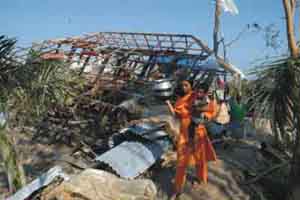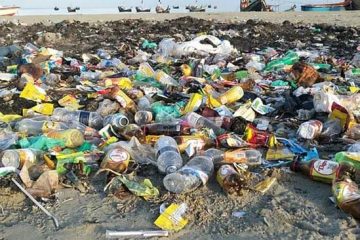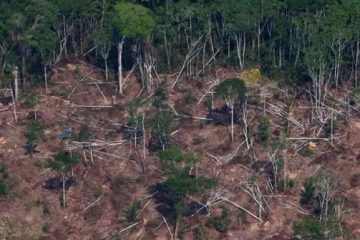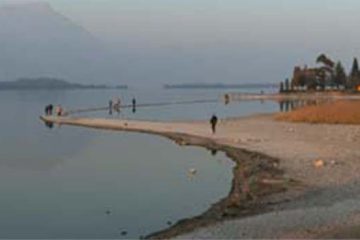Climate Change
Legal response to loss and damage
Hafijul Islam Khan
 The adverse impacts of climate change have continued to devastate the lives and livelihoods of millions of people and inflict large economic losses. According to the Fourth Assessment Report of the Intergovernmental Panel on Climate Change, there has been a global increase in weather related disasters between 1980 and 2003. The report estimated that during that period the economic loss due to damage caused by natural disasters is one trillion USD in total. Moreover, the UN Office for the Coordination of Humanitarian Affairs has estimated that in 2008 over 20 million people were displaced by sudden onset of climate-related disasters. It also reported that climate change is already causing 300,000 deaths per year throughout the world and seriously impacting the lives of 325 million people [September 2009].
The adverse impacts of climate change have continued to devastate the lives and livelihoods of millions of people and inflict large economic losses. According to the Fourth Assessment Report of the Intergovernmental Panel on Climate Change, there has been a global increase in weather related disasters between 1980 and 2003. The report estimated that during that period the economic loss due to damage caused by natural disasters is one trillion USD in total. Moreover, the UN Office for the Coordination of Humanitarian Affairs has estimated that in 2008 over 20 million people were displaced by sudden onset of climate-related disasters. It also reported that climate change is already causing 300,000 deaths per year throughout the world and seriously impacting the lives of 325 million people [September 2009].
Climate change impacts and vulnerability, particularly vis-à-vis current extreme weather events, bring up the serious legal question of liability for the loss and damage associated with climate change. Causal liability shifts the burden to the industrialised countries to take entire responsibility in response to loss and damage caused, based on proportional contribution to the cause of climate change. In the context of climate science, relative contributions of different states to climate change can be estimated based on the cumulative contribution and, as such, each state should be liable proportionally. Although one can convincingly establish substantive arguments for climate induced loss and damage based on the rules of customary international law, there are often no certain procedural means to pursue this legitimate claim further.
Therefore, in response to climate induced loss and damage, an immediate and contemporary policy framework is needed under the UN Framework Convention on Climate Change [UNFCCC]. Accepting this reality, while international climate change regime sets a structure for adaptation, the issue of loss and damage is addressed within framework that. In 2007, under the Bali Action Plan, the UNFCCC Parties agreed to consider “disaster reduction strategies and means to address loss and damage associated with climate change impacts in developing countries that are particularly vulnerable to the adverse effects of climate change ” as part of enhanced action on adaptation.
Later, in 2010, the Cancun Agreements described loss and damage as “including impacts related to extreme weather events and slow onset events” such as “sea level rise, increasing temperatures, ocean acidification, glacial retreat and related impacts, salinisation, land and forest degradation, loss of biodiversity and desertification”. Under the Cancun Agreements, the Conference of the Parties (COP) also established a work programme to consider approaches to address loss and damage and mandated the Subsidiary Body for Implementation (SBI) to agree on relevant activities. Furthermore, at COP-17 in Durban, the Parties requested the SBI to continue this work and make recommendations to decide at the COP 18.
The Durban decision on loss and damage aims at additional fact finding through research, expert meetings and stakeholder consultations to take into account at COP 18. Parties included in Annex II and other developed country parties are requested to provide financial and technical support for the implementation of the activities of the work programme agreed in Durban. In terms of governance mechanism, it was decided to explore a range of possible approaches and potential mechanisms, including an international mechanism, to address loss and damage.
However, during the negotiations many developed country Parties made it clear that they did not want to work towards the establishment of such a mechanism and hence suggestion for international mechanism was incorporated in the preambular text. They are also reluctant to provide financial support in accordance with compensation-based approaches.
Policy framework to address loss and damage associated with climate change requires a robust, transparent and credible institutional mechanism with anticipatory approaches under adaptation framework to avoid and to reduce loss and damage along with reactionary approaches beyond adaptation framework including compensation schemes. To ensure the availability of predictable and adequate fundings, a robust link to the emerging climate finance system will be crucial to meet the financial need to address loss and damage.
The Durban decision does not make loss and damage a priority issue for future climate negotiations leading to a new global climate agreement. However, the inclusion of “international mechanism” in Durban decision on loss and damage marks an important window of opportunity for further development of institutional mechanisms. Thus, we need to work further towards the establishment of a mechanism for loss and damage that provides immediate and adequate legal protection for vulnerable communities.
(Article originally published on The Daily Star)
The writer is an environmental lawyer.



